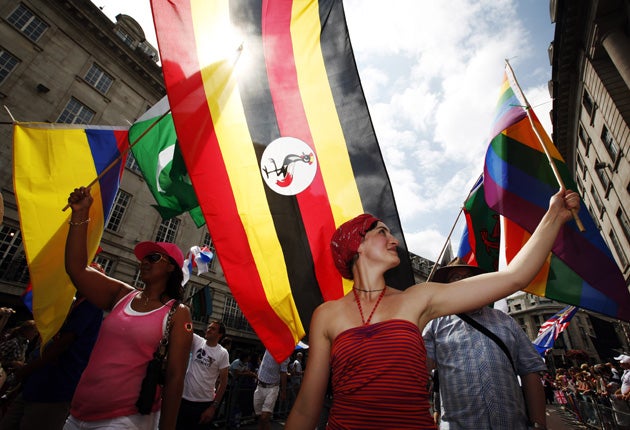Parliament to host civil partnerships
Brown wants to make Westminster more representative of country

Civil partnership ceremonies would be held at the Houses of Parliament under a plan to be put forward by Gordon Brown today.
MPs, peers and parliamentary officials are allowed to use the 14th-century Crypt Chapel in Westminster Hall for their family weddings and christenings. The Prime Minister wants the parliamentary authorities to allow civil partnership ceremonies among the same groups and to consider whether the provision could be extended to the general public.
The MPs who have got married in the Crypt in recent years include William Hague, the shadow Foreign Secretary, in 1997, and John Bercow, the Commons Speaker, in 2002.
Gay politicians who could have got married in Parliament had the rules been relaxed include Alan Duncan, the Tories' prisons spokesman who became the first Tory MP to declare his homosexuality openly in 2002, and the Culture Secretary Ben Bradshaw, who became the first MP to register a civil partnership in 2006.
Mr Brown will make his proposal when he gives evidence to a Speaker's conference about how Parliament should become more representative of the nation as a whole. The inquiry was set up by the Commons to look into why there are not more women, disabled people and people from ethnic minorities in Parliament. Mr Brown will say he hopes to see the number of women Labour MPs rise from 95 to 120 at the next general election and point out that Labour has four times as many black and Asian MPs as all the other parties put together.
The committee of 17 MPs, chaired by the Speaker, will question Mr Brown, the Tory leader David Cameron and the Liberal Democrat leader Nick Clegg today.
A row erupted on the eve of the hearing about its format. The three leaders will be questioned separately for 20 minutes each and there were Tory claims that Mr Brown had ducked out of the original plan for them to take turns at answering the same question. That would have been seen as a dry run for Britain's first televised debates at a general election.
Labour sources denied the Tory claims, dismissing them as a "smokescreen" designed to cover the Opposition's initial reluctance to see a Speaker's conference go ahead.
There are signs that the proposed TV debates may run into problems over how many should be held. Mr Brown is said to want at least six debates, while the Tories and Liberal Democrats are thought to believe that three would be enough.
But Labour is said to favour three two-man contests involving Mr Brown, Mr Cameron and Mr Clegg rather than all three leaders appearing in a single contest. Labour also wants Mr Brown and Mr Cameron to hold three issues-led discussions, such as on the economy and foreign affairs.
There could also be separate debates between the Chancellor Alistair Darling, the shadow Chancellor George Osborne and the Liberal Democrats' Treasury spokesman Vince Cable, and a foreign affairs debate between the Foreign Secretary, David Miliband, and his opposite numbers William Hague and Ed Davey.
Tory aides want to ensure that the crucial head-to-head between Mr Brown, Mr Cameron and Mr Clegg takes place on the eve of the election. They claim Labour is proposing a larger number of debates to dilute the impact of the "main event".
The BBC, ITV and Sky News are to hold talks about a format before putting proposals to the political parties.
A survey for the Pink News last week suggested that support for the Tories among gays and lesbians had fallen. It showed Labour on 36 per cent, the Liberal Democrats on 25 per cent and the Tories on 22 per cent. Its previous poll in June gave the Tories a 10-point lead over Labour.
Subscribe to Independent Premium to bookmark this article
Want to bookmark your favourite articles and stories to read or reference later? Start your Independent Premium subscription today.

Join our commenting forum
Join thought-provoking conversations, follow other Independent readers and see their replies
Comments